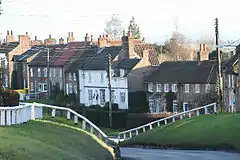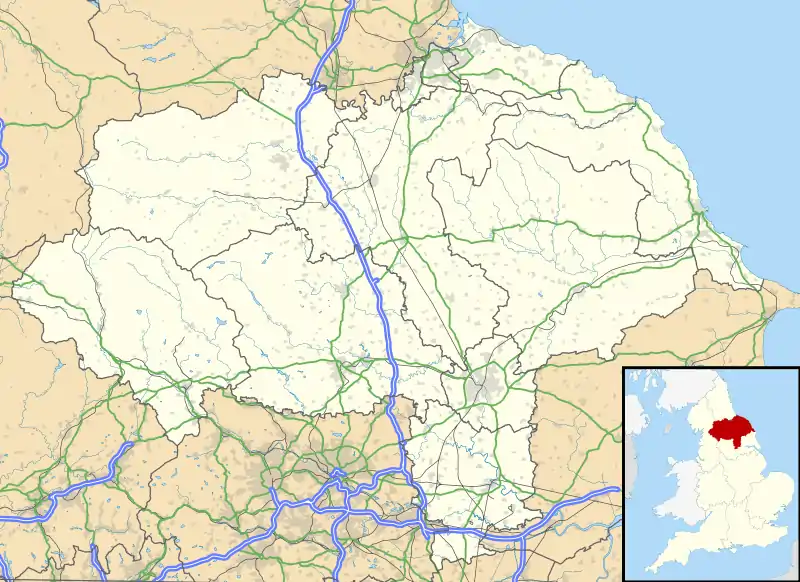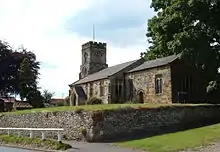Stillington, North Yorkshire
Stillington is a village and civil parish in the Hambleton district of North Yorkshire, England. It lies on the York to Helmsley road about 10 miles (16 km) north of York. Stillington Mill was the endpoint of the Foss Navigation Act of 1793.
| Stillington | |
|---|---|
 Stillington village | |
 Stillington Location within North Yorkshire | |
| Population | 782 (2011 census)[1] |
| OS grid reference | SE584678 |
| Civil parish |
|
| District | |
| Shire county | |
| Region | |
| Country | England |
| Sovereign state | United Kingdom |
| Post town | YORK |
| Postcode district | YO61 |
| Police | North Yorkshire |
| Fire | North Yorkshire |
| Ambulance | Yorkshire |
| UK Parliament | |
History
The village is mentioned in the Domesday Book as Stivelincton in the Bulford hundred. The lordship of the manor was in the possession of the Archbishop of York St Peter at the time of the Norman invasion and remained so afterwards.[2] The church continued to hold the land until 1616, when it was leased to a William Ramsden. The lease was then granted to Christopher Croft in 1625. During the first year of the Commonwealth, many church lands were put up for sale and Croft purchased the manor outright. Following the Restoration, Christopher Croft, son of the former, sought a grant from the church for the manor when many church lands were being reclaimed. He was Lord Mayor of York at the time and was knighted soon after. The Croft family held the manor until 1895 when it was sold.[3][4]
The name is derived from the name of a local Saxon settler, Styfel, and the Old English word tun, meaning farm. Therefore, as a whole it means Styfel's farm.[5]
Governance
The village lies within the Thirsk and Malton UK Parliament constituency. It also gives it name to the electoral division of North Yorkshire and the District ward of Hambleton District Council within which it lies.[6]
The local Parish Council has seven members that are re-elected every four years.[7]
Geography
The nearest settlements are Farlington 1.9 miles (3.1 km) to the east, Huby 1.7 miles (2.7 km) to the south west, Crayke 2.1 miles (3.4 km) to the north west and Sutton-on-the-Forest 2 miles (3.2 km) to the south. It is also just 3.5 miles (5.6 km) from the market town of Easingwold. The River Foss flows southwards just outside the eastern end of the village. The B1363 road between York and Oswaldkirk runs north-south through the village following the old Turnpike set up in 1768.[6]
Demography
In 1881 the population was recorded as being 600. The 2001 UK Census recorded the population as 741 in 326 households. The population was made of 50.2% males and 49.8% females, of which, 613 (82.7%) were over the age of sixteen years. There were 340 dwellings of which 155 were detached.[8] The population of the village increased to 782 at the 2011 Census.[1]
Governance
An electoral ward in the same name exists. This ward stretches north to Yearsley with a total population taken at the 2011 Census of 1,919.[9]
Amenities
Economy
The area around the village is farmland and much of the local business is still involved in this. There are some small local enterprises. The Post Office is run by the local community. There are two public houses, with the other former pub now being a food establishment.[10]
Education
A National School was built on The Green in 1821 on the site of the current village hall.[4] The present Primary School built in 1907 is located on Main Street and is within the catchment area of Easingwold School for secondary education.[11]
Sports
Stillington Sports and Social Club was founded in 1959 when the joint committees of the existing Cricket and Football Clubs purchased six acres of land from the Church Commissioners. Cricket has been played at Stillington since the 1840s, in The Park by permission of the Croft Family. The club joined the York and District League in the 1880s. Football has been played at Stillington since 1899. The Tennis Club was founded in 1976. A Bowling Green was created in 1978, with a club house added in 1997 with a Lottery grant. Two Squash courts were built in 1983. The hockey club, founded 1979, has recently disbanded.[12]
Religion

The church in the village is dedicated to St Nicholas. The current Grade II Listed building dates from the late 15th century, but has been subject to rebuilding.[13] There are records of an earlier 12th century structure.[4]
The Primitive Methodists used to have a chapel in the village. A Wesleyan Chapel was built in 1844, but has been replaced by a modern structure in 1971.[3][4][14]
Notable residents
- Lawrence Sterne - vicar of Stillington 1745–1768. Author of The Life and Opinions of Tristram Shandy, Gentleman.[4]
- John Croft (1732–1820), born in Stillington.
References
- UK Census (2011). "Local Area Report – Stillington Parish (1170216929)". Nomis. Office for National Statistics. Retrieved 11 June 2018.
- Stillington in the Domesday Book. Retrieved 29 January 2013.
- "History". Retrieved 29 January 2013.
- Bulmer's Topography, History and Directory (Private and Commercial) of North Yorkshire 1890. S&N Publishing. 1890. pp. 800–801. ISBN 1-86150-299-0.
- "Topynomy". Retrieved 29 January 2013.
- "OpenData Viewer". Ordnance Survey. Retrieved 14 October 2012.
- "Parish Council". Retrieved 29 January 2013.
- "2001 UK Census". Neighbourhood Statistics. Office for National Statistics. Retrieved 9 December 2012.
- UK Census (2011). "Local Area Report – Stillington 2011 Census Ward (1237325080)". Nomis. Office for National Statistics. Retrieved 11 June 2018.
- "Business". Retrieved 29 January 2013.
- "Browse school information for your area". North Yorkshire County Council. Retrieved 13 December 2017.
- "Sports Clubs". Retrieved 29 January 2013.
- "Church Listing". Retrieved 29 January 2013.
- "Methodist church". Retrieved 29 January 2013.
External links
| Wikimedia Commons has media related to Stillington, North Yorkshire. |